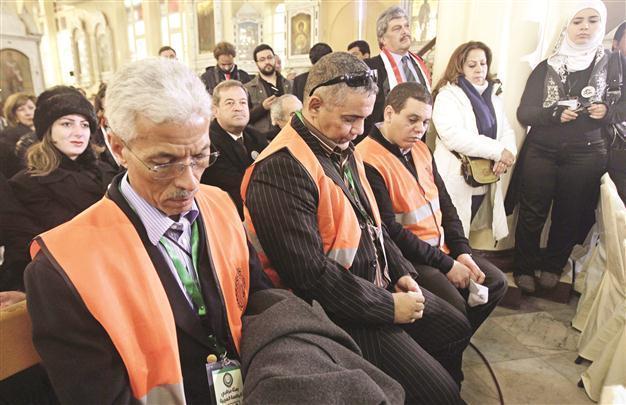Arab League divided over its Syria mission
UNITED NATIONS / DAMASCUS

Arab League observers, in orange vests, attend a mass held in Damascus on Jan 9. The observers faced accusations that the Syrian regime is interfering in their work. AFP photo
The Arab League is divided over Syria, with Qatar as the most vocal critic and Algeria defending steps taken by Damascus, as two further monitors quit their duty in the mission.Algeria’s foreign minister said Jan. 12 that Syria’s government had taken steps to defuse the crisis in the country and was the taking up arms against the opposition that threatened wider violence. The comments by Mourad Medelci at a U.N. news conference highlighted differences among Arab states over the 10-month-old anti-government uprising in Syria, which an Arab League monitoring mission is currently investigating.
“The government has taken some steps. Perhaps not enough, but some steps – in the sense that there has been a withdrawal of heavy weapons from the cities that are having problems now,” Medelci said.
Qatar, however, is critical whether the Arab League mission is meaningful any longer. Qatari Prime Minister Sheikh Hamad bin Khalifa al-Thani, who heads the Arab League committee on Syria, said doubts were growing about the effectiveness of the monitors.
“I could not see up until now a successful mission, frankly speaking,” he told a joint news conference with U.S. Secretary of State Hillary Clinton in Washington. “We hope we solve it, as we say, in the house of the Arabs, but right now the Syrian government is not helping us.”
Any admission that the monitoring mission has failed will pile pressure on the Arab League to refer Syria to the U.N. Security Council, although a Western diplomat there said Algeria, Iraq and Egypt were likely to oppose such a step. Western powers say Russia, a long-standing ally of Damascus, has blocked any tough moves by the council against Damascus and only a direct appeal by the League could shift Moscow’s view.
The killings continued in Syria, including a French journalist, despite the Arab League’s presence. However, Medelci said the shooting was coming from both sides, and that the opposition had prevented the Arab League mission from reaching neighborhoods it controlled.
The Arab League’s head of the Syria observer mission Sudanese Gen. Mohammed Ahmed al-Dabi, raised particular concern because he served in key security positions under Sudanese President Omar al-Bashir, who is wanted for crimes against humanity in Darfur. That raised questions about whether Arab League member states, with some of the world’s poorest human rights records, were fit for the mission to monitor Syria’s compliance with a peace plan.
The observers also faced accusations that the Syrian government is interfering in their work. Team member Anwer al-Malek quit, telling Al-Jazeera of his disgust that the al-Assad regime was committing “war crimes” against its own people. “The mission was a farce, and the observers have been fooled,” he said. Al-Dabi said in a statement that al-Malek’s comments were baseless and that he had not left his hotel for six days because he said he was sick.
Adnan al-Khudeir, head of the Cairo operations room to which the monitors report, told reporters Jan. 12 that two observers, one from Algeria and one from Sudan, would be returning to their home countries. He did not identify them but said the Algerian cited health reasons and the Sudanese cited personal reasons.
The Arab League chief, Nabil Elaraby said that Syrian President Bashar al-Assad’s regime was either not complying or only partially complying with an Arab League plan that Syria signed last month to end its crackdown. “We are very concerned because there were certain commitments that were not complied with,” he said in Cairo, where the League is based. “If this continues, it may turn into civil war.”
The U.N. estimates more than 5,000 people have been killed since the uprising began in March 2011.
















